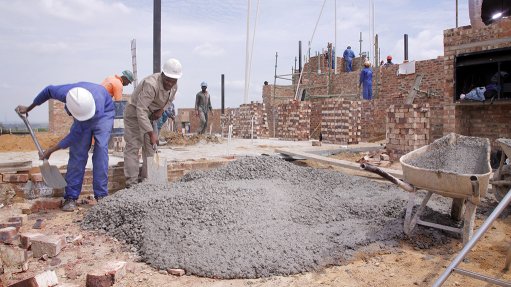Why April rainfall is key to stave off Cape Town's Day Zero
In three weeks’ time experts will be able to say with some certainty whether Cape Town is likely to get enough rain this year to avoid a Day Zero scenario in 2019.
After three dry years and months of severe water restrictions, everyone in the drought-stricken area wants to know whether we will get the above-average rains we need to fill the dams sufficiently to break the drought and see us through next summer.
Now scientists Peter Johnston and Piotr Wolski at UCT’s Climate System Analysis Group have worked out that April is key to answering that question.
After analysing rainfall figures from the Western Cape dam catchment areas from 1930 to 2017, they found that if rainfall recorded by the end of April is above normal, it is likely that we will have above normal rainfall for the rest of the year.
"If the cumulative total is above normal by the end of April we can say there is a 70% chance of it being wetter than normal by the end of the year," Johnston said.
If the rainfall by the end of April is average or below average, it does not throw light on the rest of the year’s rainfall – but May and July have some answers in that regard.
The researchers have found that if by the end of May we have had below average rainfall, we are likely to have below average rainfall for the rest of the year.
"And if rainfall by the end of May is normal, there is an equal chance of going either way."
If rainfall figures at the end of July are normal, it is likely we will have normal rainfall for the rest of the year.
"So based on statistics, if it is wetter than normal at the end of April, we are likely to have a wetter than normal year; if rainfall is normal at the end of July, we are likely to have normal rainfall and if it is drier than average at the end of May, we are likely to have a drier than average year," Johnston said.
MIGHT TAKE TIME
Nicky Allsopp, manager of the Fynbos Node at the SA Environmental Observation Network (SAEON), said dam levels might take some time to recover.
Because of three years of drought, soils had dried out and would act like sponges, absorbing a lot of rainwater and reducing run-off into dams.
She said rainfall measured at Jonkershoek, in the same mountains as the Berg and Theewaterskloof dams, showed that the last three years had had the lowest rainfall since records began in 1961.
"It has not been as dry as the 2015 to 2017 period in the 56-year record," she said.
The drop in stream flow since 2014 was unprecedented.
Allsopp said we would have enough water to fill the Cape dams sufficiently to supply water into next year only if there was a higher than normal rainfall during the rest of the year.
“It looks like we would need at least four consecutive wetter than normal months in the catchment to get enough runoff into the dams. Every time it rains more than 20 mm, we are likely to get some surface flow because the soils can’t absorb it all. But rainfall of 10 mm or less will just wet the soil,” she said.
However, five consecutive days of 10 mm of rain would result in stream flow into the dams.
Comments
Press Office
Announcements
What's On
Subscribe to improve your user experience...
Option 1 (equivalent of R125 a month):
Receive a weekly copy of Creamer Media's Engineering News & Mining Weekly magazine
(print copy for those in South Africa and e-magazine for those outside of South Africa)
Receive daily email newsletters
Access to full search results
Access archive of magazine back copies
Access to Projects in Progress
Access to ONE Research Report of your choice in PDF format
Option 2 (equivalent of R375 a month):
All benefits from Option 1
PLUS
Access to Creamer Media's Research Channel Africa for ALL Research Reports, in PDF format, on various industrial and mining sectors
including Electricity; Water; Energy Transition; Hydrogen; Roads, Rail and Ports; Coal; Gold; Platinum; Battery Metals; etc.
Already a subscriber?
Forgotten your password?
Receive weekly copy of Creamer Media's Engineering News & Mining Weekly magazine (print copy for those in South Africa and e-magazine for those outside of South Africa)
➕
Recieve daily email newsletters
➕
Access to full search results
➕
Access archive of magazine back copies
➕
Access to Projects in Progress
➕
Access to ONE Research Report of your choice in PDF format
RESEARCH CHANNEL AFRICA
R4500 (equivalent of R375 a month)
SUBSCRIBEAll benefits from Option 1
➕
Access to Creamer Media's Research Channel Africa for ALL Research Reports on various industrial and mining sectors, in PDF format, including on:
Electricity
➕
Water
➕
Energy Transition
➕
Hydrogen
➕
Roads, Rail and Ports
➕
Coal
➕
Gold
➕
Platinum
➕
Battery Metals
➕
etc.
Receive all benefits from Option 1 or Option 2 delivered to numerous people at your company
➕
Multiple User names and Passwords for simultaneous log-ins
➕
Intranet integration access to all in your organisation


















